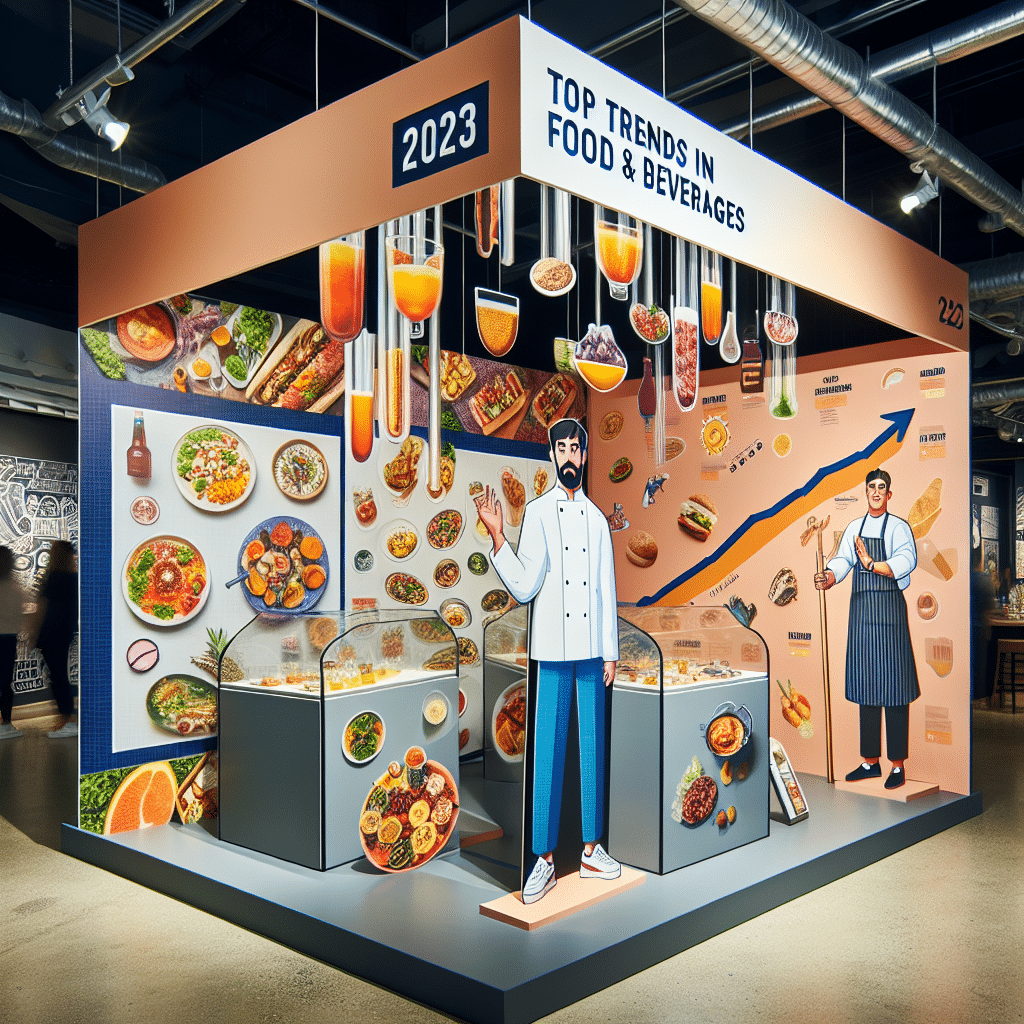2023 Food and Beverage: A Retrospective on Top Trends
-
Table of Contents
- 2023 Food and Beverage Trends: A Comprehensive Retrospective
- Plant-Based Revolution Continues
- Functional Foods Gain Ground
- Zero-Waste and Sustainability Efforts
- Global Flavors and Fusion Cuisine
- Technology and Personalization
- Non-Alcoholic Beverages on the Rise
- Conclusion
- ETprotein: Your Source for High-Quality Protein Products
2023 Food and Beverage Trends: A Comprehensive Retrospective

The food and beverage industry is a dynamic and ever-evolving landscape, with trends that come and go with the changing tastes and preferences of consumers. As we look back on 2023, it’s clear that the year was marked by a number of significant trends that not only shaped the industry but also reflected broader societal shifts. From the rise of plant-based alternatives to the embrace of global flavors, the past year has been a testament to innovation and adaptability in the food and beverage sector.
Plant-Based Revolution Continues
The plant-based movement has been gaining momentum for several years, and 2023 was no exception. Consumers continued to seek out meat and dairy alternatives for reasons ranging from health concerns to environmental impact. This led to an explosion of plant-based products on the market, with companies innovating to improve taste, texture, and nutritional value.
- Plant-based meats became more sophisticated, with improvements in mimicking the taste and texture of real meat.
- Dairy-free alternatives expanded beyond almond and soy milk, with oat milk leading the charge due to its creamy texture and eco-friendly production.
- Plant-based seafood emerged as a new frontier, with startups developing alternatives to fish and shellfish.
Functional Foods Gain Ground
As health and wellness continued to be a priority for many, functional foods—those containing additional health benefits beyond basic nutrition—saw a surge in popularity. Consumers looked for products that not only satisfied hunger but also offered a boost to their overall well-being.
- Probiotics and prebiotics were incorporated into a wider range of products, from snacks to beverages, promoting gut health.
- Adaptogens, such as ashwagandha and reishi mushrooms, were included in products to help manage stress and improve mental clarity.
- Superfoods like moringa, matcha, and turmeric were featured in products for their antioxidant properties and health benefits.
Zero-Waste and Sustainability Efforts
Environmental concerns have led to a greater focus on sustainability within the food and beverage industry. In 2023, companies took significant steps to reduce waste and minimize their carbon footprint.
- Upcycled foods, made from ingredients that would otherwise go to waste, became more prevalent.
- Brands committed to reducing plastic packaging, with some transitioning to biodegradable or compostable alternatives.
- Carbon-neutral products gained traction, with companies investing in carbon offset programs and sustainable sourcing practices.
Global Flavors and Fusion Cuisine
Globalization and a growing curiosity about different cultures have led to an increased demand for international flavors. In 2023, consumers were more adventurous with their palates, seeking out authentic and fusion cuisine experiences.
- Regional cuisines from Africa, South America, and Southeast Asia became more popular, with a particular emphasis on bold and spicy flavors.
- Fusion dishes that combine elements from different culinary traditions captured the imagination of foodies looking for unique eating experiences.
- International condiments and spices, such as gochujang and za’atar, found their way into mainstream supermarkets and home kitchens.
Technology and Personalization
Advancements in technology have allowed for greater personalization in the food and beverage industry. In 2023, consumers enjoyed products tailored to their individual dietary needs and preferences.
- Personalized nutrition plans, based on genetic testing and AI algorithms, offered customized dietary recommendations.
- Smart packaging, equipped with QR codes and NFC tags, provided consumers with detailed product information and traceability.
- 3D food printing technology began to enter the market, offering customized shapes, textures, and nutrition profiles.
Non-Alcoholic Beverages on the Rise
The non-alcoholic beverage sector saw significant growth in 2023, as consumers looked for healthier and more inclusive drinking options.
- Non-alcoholic spirits, beers, and wines improved in quality and variety, providing a sophisticated alternative to traditional alcoholic beverages.
- Functional drinks, such as those containing CBD or nootropics, offered relaxation and cognitive benefits without the alcohol content.
- Mocktail culture flourished, with bars and restaurants offering creative and complex non-alcoholic cocktails.
Conclusion
The food and beverage industry in 2023 was characterized by a continued push towards plant-based products, an emphasis on health and functionality, a commitment to sustainability, a celebration of global flavors, the integration of technology for personalization, and the rise of non-alcoholic beverages. These trends not only reflect the changing preferences of consumers but also point to a more health-conscious, environmentally aware, and globally connected society. As we move forward, it will be interesting to see which of these trends will have the staying power to influence the industry in the years to come.
ETprotein: Your Source for High-Quality Protein Products
In light of the growing demand for plant-based and functional foods, ETprotein’s range of protein products stands out as an excellent choice for consumers and manufacturers alike. Their extensive selection of organic bulk vegan proteins and L-(+)-Ergothioneine (EGT) caters to the needs of various industries, including food and beverage, sports nutrition, and health and wellness.
ETprotein’s commitment to quality, non-GMO, allergen-free products with high purity levels makes them a reliable partner for those looking to incorporate plant-based proteins into their offerings. Whether you’re developing new food products or seeking to enhance existing ones, ETprotein provides the ingredients necessary to meet the demands of today’s health-conscious consumers.
About ETprotein:
ETprotein, a reputable protein and L-(+)-Ergothioneine (EGT) Chinese factory manufacturer and supplier, is renowned for producing, stocking, exporting, and delivering the highest quality organic bulk vegan proteins and L-(+)-Ergothioneine. They include Organic rice protein, clear rice protein, pea protein, clear pea protein, watermelon seed protein, pumpkin seed protein, sunflower seed protein, mung bean protein, peanut protein, and L-(+)-Ergothioneine EGT Pharmaceutical grade, L-(+)-Ergothioneine EGT food grade, L-(+)-Ergothioneine EGT cosmetic grade, L-(+)-Ergothioneine EGT reference grade and L-(+)-Ergothioneine EGT standard. Their offerings, characterized by a neutral taste, non-GMO, allergen-free attributes, with L-(+)-Ergothioneine purity over 98%, 99%, cater to a diverse range of industries. They serve nutraceutical, pharmaceutical, cosmeceutical, veterinary, as well as food and beverage finished product distributors, traders, and manufacturers across Europe, USA, Canada, Australia, Thailand, Japan, Korea, Brazil, and Chile, among others.
ETprotein specialization includes exporting and delivering tailor-made protein powder and finished nutritional supplements. Their extensive product range covers sectors like Food and Beverage, Sports Nutrition, Weight Management, Dietary Supplements, Health and Wellness Products, and Infant Formula, ensuring comprehensive solutions to meet all your protein needs.
As a trusted company by leading global food and beverage brands and Fortune 500 companies, ETprotein reinforces China’s reputation in the global arena. For more information or to sample their products, please contact them and email sales(at)ETprotein.com today.












